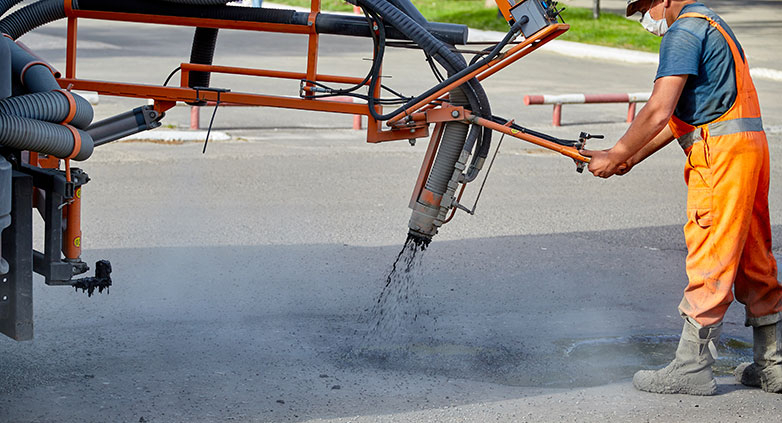Best Parking Lot Sealer to Consider For Your Lot
Your home or business parking lot is a huge investment, and it’s one that takes a deal of time and resources to get it exactly the way you desired it. That’s why your safest choice for preserving that investment is a decent seal coat.
If it’s been a couple of years since you paved your parking lot and it’s beginning to look rough and worn out, it might be time to seal it. Parking lot seal coating is distinct from resurfacing. Resurfacing is mostly used to cover gaps or holes in your pavement, while seal coating is used to put back the rich look of your pavement and provide a layer of protection to prolong its service life.
But what is the best parking lot sealer?
Based on experts’ recommendations, there are four categories of sealers that work best for parking lots depending on the parking lot’s design, current state, and traffic level. They include Bio-based Parking lot Sealcoating, Refined Tar-based seal coating, Acrylic Concrete Sealers, Silane/siloxane, Asphalt-based pavement sealer Specialty resins.
They are currently the best parking lot surface sealers due to their superior protection, adhesion, durability, and flexibility they offer your pavement, extending its service life.
There are varieties of brands of parking lot sealers out there to consider. Each one does a pretty decent job of protecting your parking lot from deteriorating with time, but there are some substantial variations between them.
A seal coat product you should consider is one that can shield your parking lot from damage triggered by UV rays, fluid from vehicles, and oxidation while also preventing water penetration into the substrate. Aesthetics and environmental considerations should also be weighed by property owners when deciding on a seal coat.
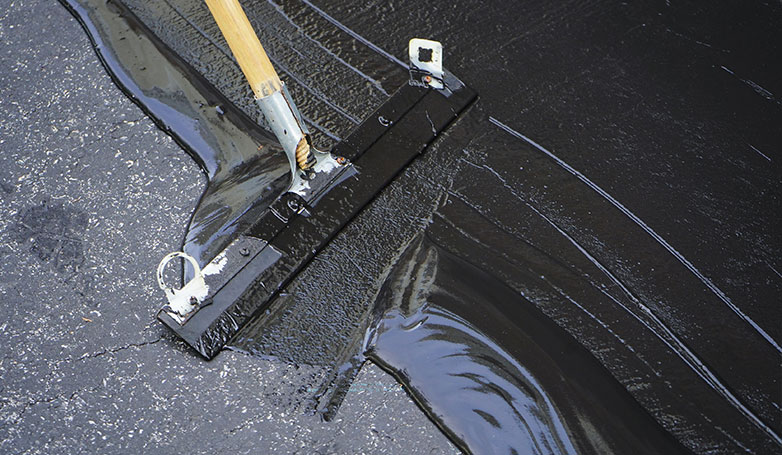
Best sealer for asphalt parking lots
Below is the list of the top 4 categories of sealers recommended for asphalt parking lots based on experts analysis, including:
- Bio-based Parking Lot Sealcoats
- Asphalt-based pavement sealer
- Specialty resins
- Refined Tar-based seal coating
The best asphalt parking lot sealer is probably one that utilizes filled-sealer formulations. There are more solid ingredients in these types of sealers that cover tiny cracks and holes leftover during the paving process, shielding them well from the elements than less solid sealers.
Biobased Parking Lot Sealcoats
When you talk of the best parking lot sealer, Biobased Sealcoat is among the top products, using soybean oil as one of its primary raw materials. It is uniquely formulated to shield parking lots from UV, chemical exposure, oxidation, and other common asphalt enemies. The product has also been developed with sustainability in mind, making it possible for striping and reopening of parking lots on the very same day. Biobased sealers cure 4 to 5 times faster than traditional products.
You can restripe the parking lot covered with Biobased sealer within 2 hours of seal coating. This is facilitated by the formula’s chemical properties, which enables the application of the product at 1⁄4 the thickness of traditional parking lot seal coating while offering superior protection. This enables the product’s application even later into the season compared to coal tar sealers.
BioSealcoat sealer cures to a jet-black, matte finish explicitly formulated not to fade with time, guaranteeing a durable, uniform look. While biobased seal coats cost considerably more (on a cost per gallon basis), their improved efficiency enables total project costs to be equivalent to other sealers.
BioSealcoat was also developed with sustainability in mind; it is among a couple of seal coating products on the market with no identifiable PAHs (based on EPA testing) and releases no unpleasant odor. As the only USDA Approved seal coat on the market, integrating a biobased seal coat into a pavement maintenance practice can show a dedication to the environment.m
Asphalt Based Pavement Sealer
Asphalt-based pavement sealer is an environmentally sustainable, mineral enhanced asphalt emulsion pavement sealer formulated with unique surfactants for optimal adhesion, longevity, and flexibility. It is also another best parking lot sealer that regenerates the binder that is depleted by weathering and aging, offering more excellent protection against environmental disruption.
This type of sealer is suitable for protecting all forms of asphalt pavement surfaces such as parking lots, low traffic roadways, driveways, and much more.
Specialty resins
This type of coating possesses highly performing properties similar to the ones in Refined based seal coating (RTS). It is exceptionally resistant to degradation as a result of ultraviolet rays, weathering, salts, and petrochemicals. The exciting thing about this coating is that the specialty resin formulation is tailored to each customer’s needs.
Refined Tar-based seal coating
This coating consists of TR-12 (a highly refined coal tar) commonly created when coal is being transformed to coke for metallurgy. Refined tar-based sealer consists of various steady chemicals that remain unaffected by damaging elements of sunlight, petrochemicals, and salts. RTS is extremely dependable since it is regarded as the workhorse of the industry.
Its compositions and properties are thoroughly delineated to support your lifelong coating necessities.
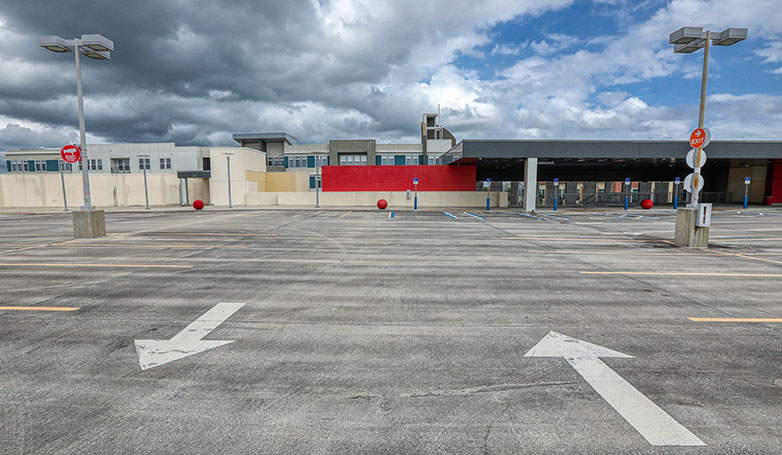
Best sealer for concrete parking lots
The following are the highly recommended sealing options for your concrete parking lot:
- Silane/siloxane sealer(Siloxa-Tek 8510)
- Acrylic Concrete Sealers
- Mold-inhibiting concrete pavement sealer(Aqua-X)
- Quikrete Concrete and Masonry High Gloss Sealer
- Foundation Armor SX5000 Clear Concrete Sealer(Solvent-based)
Silane/siloxane sealer (Siloxa-Tek 8510)
The Siloxane-Tek 8510 can permeate through the surface openings of the concrete to saturate the concrete itself. The sealer will cover up the air pockets inside the material, resulting in deep and permanent protection from the climate, oil, road salt, heavy usage, and other vehicle stains.
If you are considering getting the best parking lot sealer for your concrete lots, Siloxa-Tek 8510 is a good option.
With the Siloxa-Tek 8510, any water from snowmelt or rain, and any other liquid stains, will bead on the concrete surface. Its performance is plain to the naked eyes, and you can see it with your eyes working, helping to give you peace of mind regarding your concrete parking lot.
Acrylic Concrete Sealers
Acrylic sealer is the most commonly preferred sealer for a concrete parking lot. In addition to being cost-effective, their application is precise and swift. They can be applied almost immediately after the concrete is installed and are considered to have outstanding recoating capabilities. Besides, some acrylics are resistant to ultraviolet rays.
Furthermore, acrylic is an excellent type of sealer if you are looking for a concrete sealer that works well against deicing salt, moisture, and chemical or oil penetration.
Mold-inhibiting concrete pavement sealer(Aqua-X)
AQUA-X is reinforced with mildew and mold inhibitors and is a great option if you reside in a rainy or moist area. Two coats stave off mildew and mold, offer a clean, flawless appearance, and shield concrete from freezing and thawing cycles and water for up to 5 years.
Solvent-free AQUA-X is an environmentally-friendly, low VOC sealer (so no concern about chemical fumes), and one gallon, poured or rolled on, fills up to 500 sq ft.
Quikrete Concrete and Masonry High Gloss Sealer
This concrete pavement sealer is fantastic for stamped concrete parking lots when a wet look is sought. It retains a glossy sheen as well as protection from chemical deicing products, oil and grease spills, and food stains.
Foundation Armor SX5000 Clear Concrete Sealer(Solvent-based)
This type of sealer provides parking lot protection you can rely on even in cold environments. This penetrating sealer’s singular coat can create a protective bond with the parking lot surface, shielding it for seven to ten years from damage triggered by salts, deicing chemicals, stains, and freezing & thawing cycles.
The SX5000 won’t alter the appearance of your parking lot or create a film, and one gallon fills up to 200 sq ft.
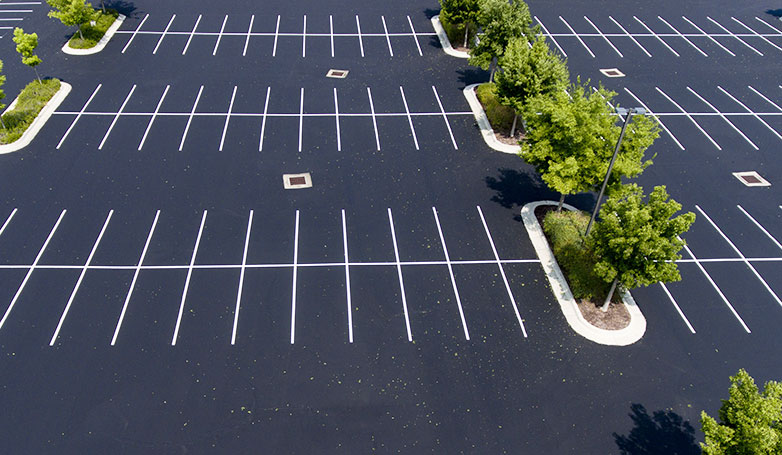
Why it’s important to seal your parking lot
It is vital to have your lot sealed with any best parking lot sealer over time (especially for asphalt surface) since an asphalt pavement surface oxidizes over time and becomes gray or faded in color. Seal coating offers a vivid black finish that preserves and enhances your parking lot’s life expectancy. In addition to the traffic on the lot, weather conditions will play a role in seal coating frequency.
It is the right choice to get your parking lot inspected by a paving expert if it shows any signs of cracking, fading, and wear and tear.
How sealers can protect your lot
The following are ways sealers can protect your lot:
- Slow oxidation rate: Sealcoating covers surface voids, decreasing oxygen and UV ray exposure and reducing the extent to which the pavement can be penetrated by oil or gas.
- Slow the rate of water penetration: Sealcoating serves as a waterproofing agent, which minimizes the level at which water reaches the pavement. Water will penetrate more easily without it, leading to the pavement freezing and thawing expansion and pavement.
- Resistant to gas and oil spills: Gasoline leakage during hot weather from a topped-off fuel tank can soften and break down unsealed asphalt pavements. Coal tars used in seal coats are resistant to the spills of gas and oil.
- Improves pavement pliability: Sealcoat offers your pavement a dark black shine. The more black it is, the more heat is absorbed from the sun by the pavement. And, the hotter it becomes, the more it becomes malleable, allowing it to endure traffic without cracking. Hence, it is a smart idea to have your parking lot seal coated with any best parking lot sealer.
- Protects asphalt from washing by pressure: Restaurant parking lots usually stretch to areas close to dumpsters where pressurized washing of food processing equipment occurs. If food waste that is close to the dumpsters can’t be swept up, it will need to be washed away—seal coating shield asphalt cement from the detergents and high volume water pressure being utilized in pressure washing.
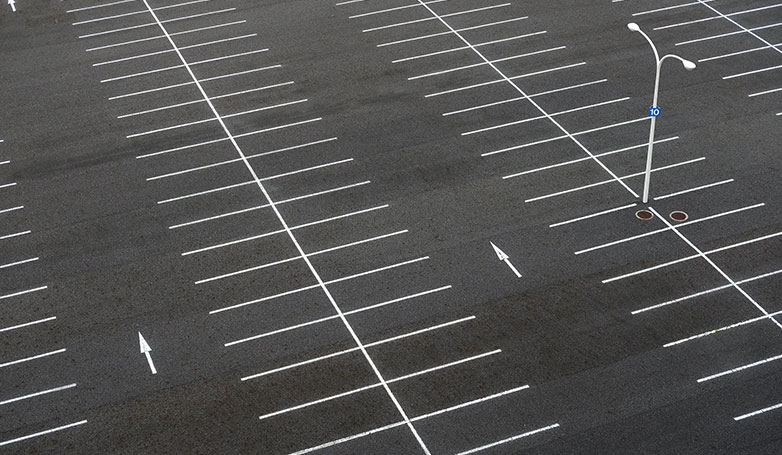
How often should you seal your parking lot?
How often seal coating should be done depends on many factors, which include, but not limited to the ones that follow:
- The quality of the pavement sealing material
- The number of material you applied
- Adequate sealer mix design
- Geographic area
- The number of coats you applied
- The level of daily traffic
Sealcoating is usually recommended every three to four years to offer sufficient pavement protection and appealing curb appeal for your commercial property or home. After the original asphalt application on your parking lot, the optimum time is typically one to two years to ensure adequate cure.
Besides, the sort of components you choose will also enable your paving contractor to ascertain the number of coats needed for your parking lot.
The process of sealing your lot
An asphalt parking lot surface will typically need two seal coat applications at first to penetrate the surface, resulting in a deep, protective coating.
- Assess the surface. Your paving contractor would have to first evaluate the current condition of the lot’s surface before proceeding further. You will not need seal coating for 12-24 months if it is a new surface. However, if it is an existing surface, your contractor will first check for potholes, oil stains, cracks, and other damage that might require fixing before applying any best parking lot sealer you may have in mind.
- Make the surface clean: The parking lot surface would need to be extensively washed using brushes, brooms, or power washers, ensuring the seal coat can bind adequately. This is also vital because before repairs can commence, all potholes, cracks, and damaged sections will have to be cleaned as well.
- Recognize cracks and fix, as required: If there are cracks, holes, or depressions, they should be covered with a correct aggregate mix to guarantee prolonged asphalt integrity and longevity.
- Reparation of Pothole: Fix or patch all potholes to ensure that the surface looks and works at its best before seal coating.
- Surface priming and cleaning of oil spots: Before seal coating, it is necessary to remove oil stains from the asphalt parking lot because the seal coat will not adhere to vehicle pollutants of any sort. If you could not have the stain removed, try using a primer agent (somewhat like a wall primer) that will cause the seal coat to adhere to the surface of the asphalt lot.
- Apply a minimum of two coats of quality pavement sealer. After ensuring that the surface pavement is free of any dirt, stains, or any form of damage, you can then apply a top-quality sealant to the surface.
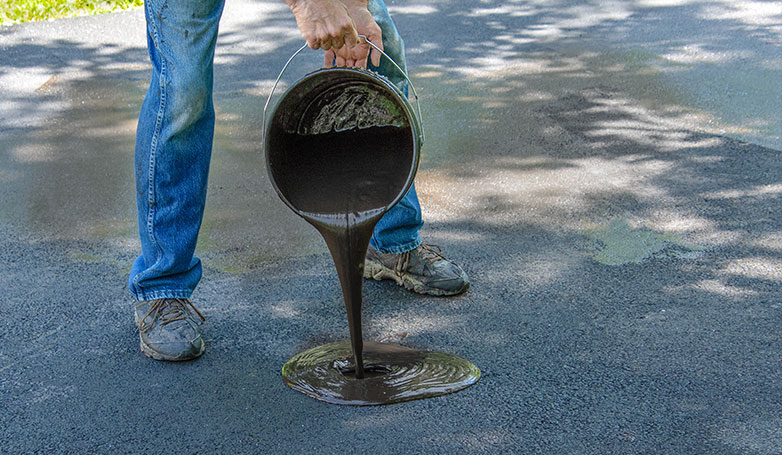
What are the conditions for conducive long-lasting seal coats?
Weather conditions significantly impact seal coats, particularly during construction. The proper conditions under which seal coating should be carried out are warm temperatures and sunny days with low humidity since cool weather and humidity will slow the curing time, causing seal coat’s tendering for a prolonged period, making it more vulnerable to traffic damage.
This is, however, the reason contractors recommend getting the best parking lot sealer when you consider carrying out seal coating for your lot.
Rain can trigger severe issues when seal coating. If you carry out the application prior to the asphalt binder’s curing, it can become diluted, rising above the aggregate cover top.
After the water has evaporated, asphalt can fill the whole surface, triggering tires to track the binder around the surface or pick up the aggregate. It would be best if you avoid seal coating your parking lot when showers are making threats. Also, ensure the asphalt surface you want to seal coat is relatively in a good state.
This implies that load-related distress like rutting, alligator cracking, and potholes should be minimal. If all these conditions exist in your parking lot, avoid seal coating until they are addressed first.
Conclusion
When you are planning seal coating for your parking lot, it is best to choose the right sealing product that would work best for your pavement. There are varieties of sealers on the market, but not all can deliver the required good result.
Hence, it would be best if you employed a pavement maintenance specialist who has excellent ability to assess the pavement surface and offer the best possible solutions to your parking lot maintenance requirements for the best performance.

